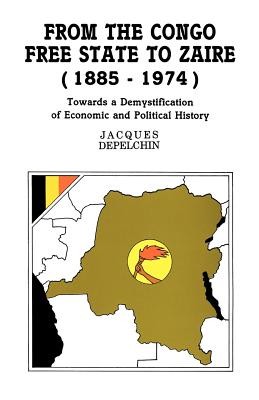
- We will send in 10–14 business days.
- Author: Jacques Depelchin
- Publisher: Codesria
- Year: 1999
- Pages: 240
- ISBN-10: 1870784103
- ISBN-13: 9781870784108
- Format: 14 x 21.6 x 1.3 cm, minkšti viršeliai
- Language: English
- SAVE -10% with code: EXTRA
From the Congo Free State to Zaire (1885-1974). Towards a Demystification of Economic and Political History (e-book) (used book) | bookbook.eu
Reviews
Description
Where did the fabled riches of the Congo go, and what happened to all the capital accumulated by colonial history? Why is Zaire still underdeveloped, while the Belgian economy now thrives? Tapping many and varied sources, this book challenges dominant historiographical assumptions and practice while analysing the past and present impact of Belgian joint stock companies on the Zairean economy. The author, an academic and specialist on African historiography and methodology, argues that colonialism paved the way for the triumphant return of other colonizers - the multinational corporations under the hegemony of the WorldBank and the International Monetary Fund, with structural adjustment replacing pacification. The author's contention is that his investigation of the Zairean economic history overturns colonial assumptions, rooting its analyses in the people's own history, raising questions both about the colonial past, but also about the framework underlying previous analyses.
EXTRA 10 % discount with code: EXTRA
The promotion ends in 23d.03:13:33
The discount code is valid when purchasing from 10 €. Discounts do not stack.
- Author: Jacques Depelchin
- Publisher: Codesria
- Year: 1999
- Pages: 240
- ISBN-10: 1870784103
- ISBN-13: 9781870784108
- Format: 14 x 21.6 x 1.3 cm, minkšti viršeliai
- Language: English English
Where did the fabled riches of the Congo go, and what happened to all the capital accumulated by colonial history? Why is Zaire still underdeveloped, while the Belgian economy now thrives? Tapping many and varied sources, this book challenges dominant historiographical assumptions and practice while analysing the past and present impact of Belgian joint stock companies on the Zairean economy. The author, an academic and specialist on African historiography and methodology, argues that colonialism paved the way for the triumphant return of other colonizers - the multinational corporations under the hegemony of the WorldBank and the International Monetary Fund, with structural adjustment replacing pacification. The author's contention is that his investigation of the Zairean economic history overturns colonial assumptions, rooting its analyses in the people's own history, raising questions both about the colonial past, but also about the framework underlying previous analyses.


Reviews